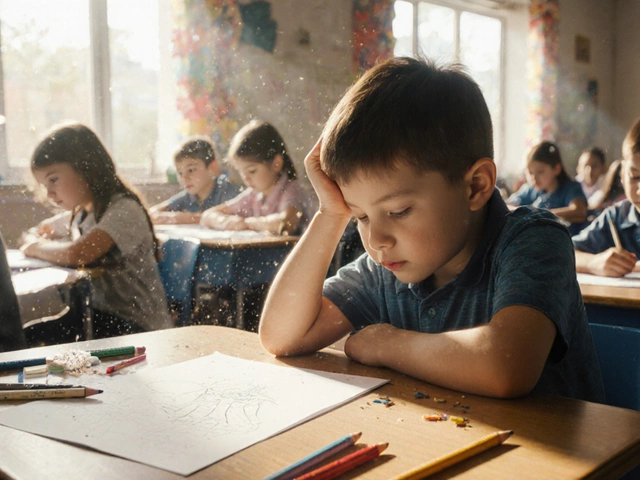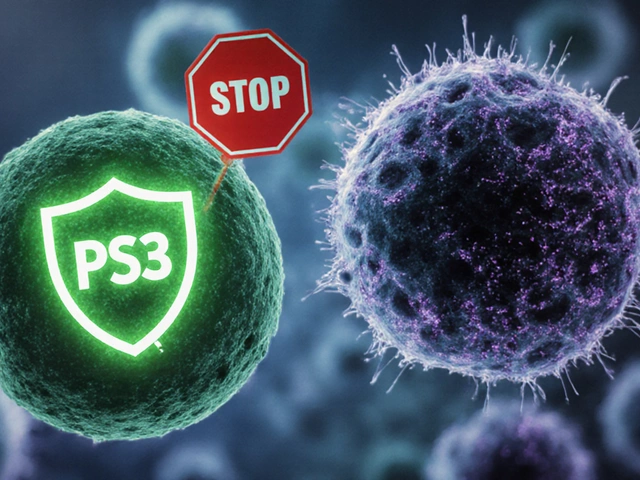Picture this: a seven-year-old can't sit still in class, keeps forgetting his homework, and blurs out answers before anyone else gets the chance. Then, fast-forward a decade, and now you've got a teenager who’s always late, loses everything from keys to homework, and is drawn to risky adventures. ADHD is like your unpredictable neighbor—always popping up when you least expect, never showing up the same way twice, and making you wonder, “When was this supposed to be easy?”
The Shifting Face of ADHD: It’s Not the Same at Every Age
ADHD, or Attention Deficit Hyperactivity Disorder, doesn’t follow a one-size-fits-all script. The way it shows up at six isn’t the same as how it ambushes you at sixteen or thirty-six. Scientists at the CDC found that nearly 10% of children aged 3-17 have been diagnosed with ADHD, but here’s the twist: symptoms morph as the brain grows. Younger kids usually deal with hyperactivity—the endless fidgeting, running, and impulsive “Look at me!” moments. Once those kids hit middle school or puberty, everything changes. Suddenly, it’s harder to control emotions, multi-step projects seem Herculian, and social issues pop up like zits during exam week.
By adulthood, hyperactivity may cool down, but the struggle with focus, procrastination, and organization stays stubborn. It's like your brain traded one set of issues for another, without ever asking your permission. This all means there’s no single 'hardest' age; rather, every stage comes with its personal boss fight.
If you ever wondered why your energetic nephew seemed easier to deal with at age four than at fourteen, you’re not imagining things. Younger kids get structure at school and home. Teenagers, on the other hand, are told to manage themselves, plus hormones throw fuel on the fire. Adults? Well, you’re left juggling work, relationships, and maybe even kids of your own—while still battling the same old mix-ups and mind fog.
Breaking Down the Hardest Ages for ADHD
Ask ten families, and you’ll get ten different answers about the worst age for ADHD. But there’s a pattern. For tons of people, power struggles and friction hit a peak during transitions—think ages 6-8 (when school starts expecting focus), ages 12-15 (when school gets hard and social life goes wild), and the early 20s (when independence turns from fantasy to daily reality).
A 2021 study in the journal "JAMA Psychiatry" clocked a dramatic spike in ADHD symptoms during puberty, especially for girls, thanks to hormonal changes. Executive function—the ability to plan, organize, and control impulses—barely catches up until the mid-20s. Until then, kids and teens with ADHD are basically running a marathon with untied shoes. That's why middle and high school are often described as the "hardest years." Teachers get less forgiving, assignments pile up, and peer pressure is relentless. A teen with ADHD isn't just distracted—they're trying to swim against the current every single day.
Let’s not forget adulthood, though. Bills, work deadlines, missed appointments, and lost keys add up fast. Around 60% of kids who are diagnosed with ADHD still experience symptoms as adults, according to the American Psychiatric Association. Life doesn’t grant much grace if you lose your train of thought in the middle of a meeting, and there’s no teacher waiting to gently redirect you back on track.

Real-Life Impact: How Hard Is It, Really?
If you’re a parent or someone with ADHD, every age brings a different flavor of challenge. Preschoolers might be all energy and noise, but at least they’re forgiven for skipping across the room. Middle schoolers with ADHD, in contrast, can face harsher judgment. Forgetting homework isn’t “cute” anymore. And teens have to deal with teachers, parents, and friends who may lose patience once impulsivity starts causing trouble.
Here’s where things get dicey: adolescence is the most common time for co-occurring issues to pop up. The CDC has a table showing higher rates of anxiety, depression, and even substance use in teens with ADHD compared to those without. If you’re dealing with emotional blow-ups, risky decisions, or blowing curfew, ADHD might be driving some of it under the hood.
| Age Group | Main Challenges | Common Co-Occurring Issues |
|---|---|---|
| Preschool | Hyperactivity, impulsiveness | Sleep difficulties |
| School Age (6-12) | Inattention, organization problems | Learning difficulties |
| Adolescence (13-18) | Impulsivity, emotional swings | Anxiety, depression, substance use |
| Young Adulthood (19-30) | Time management, life skills | Relationship strain, job issues |
Adults with ADHD say life gets harder when “adulting” hits—paying bills, running errands, juggling jobs, and managing relationships. There’s no built-in support system, so tasks that look simple to others—like sticking to routines or meeting deadlines—become mountains to climb. The hardest age? Maybe it stretches all the way from puberty into the late 20s, when you’re expected to just figure it all out on your own.
What Makes Each Stage Tough—And How Do You Deal?
So why exactly does ADHD seem like it throws the biggest curveballs at certain ages? The answer boils down to two things: higher expectations and shifting environments. Early school years hit kids with structure and rules. If focus or sitting still feels impossible, trouble starts early. For teens, the social scene complicates things. Emotional control isn’t baked in yet, so friendships can blow hot and cold in a flash. Peer rejection happens more often to teens with ADHD, says a 2019 study in "Child Development"—and that social pain can linger for years.
Fast-forward to adulthood. Now, nobody's reminding you to focus or finish that project. The cushion of home and school is gone. Financial independence and romantic relationships add another layer of stress. Losing a job, getting stuck in traffic court thanks to missed mail, juggling Netflix, life, and deadlines—adults find new ways to get overwhelmed.
When ADHD hits hard, here are some things that genuinely help, tailored for each life stage:
- Young kids: Routines, visual schedules, and lots of positive feedback help tame the chaos.
- School age: Chunk big projects into tiny steps, use reminders, and advocate for classroom accommodations.
- Teens: Build support for managing emotions and time, and encourage healthy outlets like sports or creative hobbies.
- Adults: Digital reminders, checklists, coaching, and tools like phone alarms or habit-tracking apps can make an incredible difference. Find someone who can be your stache of accountability—partners, friends, or even a therapist.
Max, my dog, grabs the leash and waits by the door if I forget evening walks—his routine keeps both of us in check. Luna, the cat, reminds me in her own, loud way when it’s meal time. If only managing busy adult life was that cute.

Tips to Survive (and Thrive) at Every Turn
Living with ADHD doesn’t follow a neat path, and the hardest age varies for everyone. There's solid proof, though, that people who discover tools and tricks early do better in the long haul. Here are a few things that can ease the journey, whether you’re six or sixty:
- Find your strengths—ADHD brains are creative, motivated, and often think outside the box. Lean on what makes you different.
- Don’t fight the brain you’ve got—work with it. If routines bore you to tears, mix things up. If mornings are your worst nightmare, shift big tasks to afternoons.
- Build a support team—parents, friends, teachers, coaches, or therapists. Everyone needs a squad, especially on tough days.
- Use ADHD hardest age as a search phrase to find stories and advice from others walking a similar path. Community reduces the isolation, and you'll pick up some gold nuggets to try yourself.
- Remember: setbacks don’t erase progress. There’s no straight line with ADHD. Celebrate wins, cut yourself slack on rough patches, and keep your eyes on the next step—not the finish line.
The single hardest age for ADHD? It’s whenever life demands outstrip the brain’s coping skills. Some say childhood, some shout teen years, others quietly mutter “adulthood, hands down.” The only real answer is: you’re not alone, no matter which age you’re in the thick of. And there’s always another hack, helper, or new approach to try next.

 At What Age Is ADHD at Its Peak? Understanding Symptom Trends Across Life
At What Age Is ADHD at Its Peak? Understanding Symptom Trends Across Life
 How to Stop Cancer Cells from Growing: Key Treatments Explained
How to Stop Cancer Cells from Growing: Key Treatments Explained
 How Did Kelly Clarkson Lose All Her Weight? Real Strategies Behind Her Transformation
How Did Kelly Clarkson Lose All Her Weight? Real Strategies Behind Her Transformation
 What Is the Hardest Surgery to Recover From? Heart Transplant Recovery Explained
What Is the Hardest Surgery to Recover From? Heart Transplant Recovery Explained
 How to Identify Legitimate Online Pharmacies Safely
How to Identify Legitimate Online Pharmacies Safely